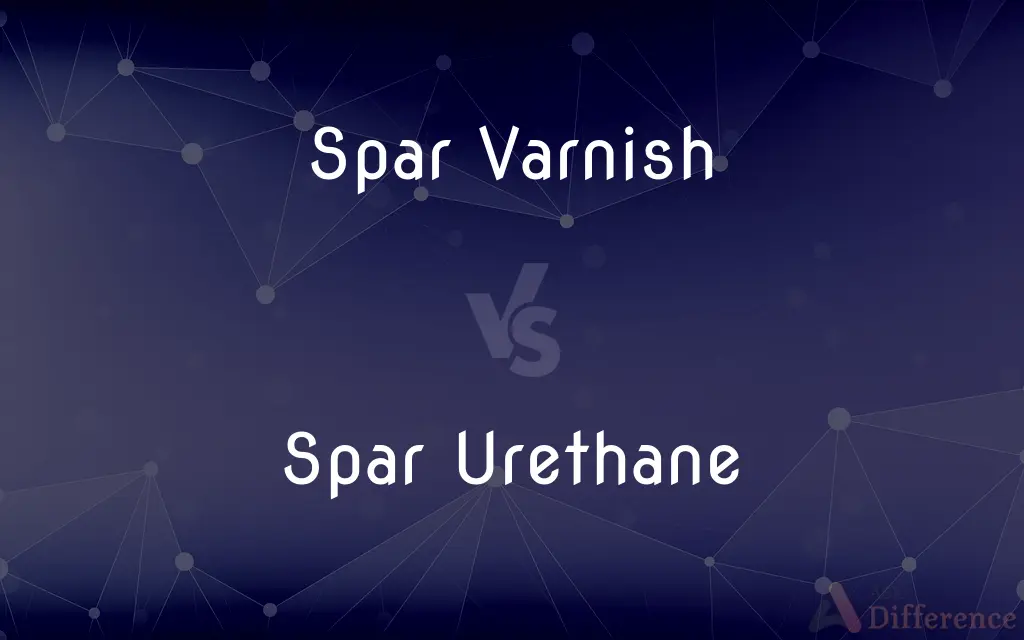Spar Varnish vs. Spar Urethane — What's the Difference?
By Urooj Arif & Maham Liaqat — Published on October 7, 2024
Spar varnish, made from natural oils and resins, offers excellent water resistance and flexibility. Spar urethane, a synthetic product, provides similar protection with added UV resistance and durability.

Difference Between Spar Varnish and Spar Urethane
Table of Contents
ADVERTISEMENT
Key Differences
Spar varnish, originating from its use on ship spars, is a traditional finish designed to protect wood from harsh marine conditions. Its formulation, based on natural oils and resins, allows for a flexible finish that can expand and contract with the wood, preventing cracking or peeling. On the other hand, spar urethane, a more modern invention, incorporates synthetic resins and polyurethane, offering a tougher, more durable finish.
While both finishes are designed for use in environments where wood is exposed to moisture and sunlight, their chemical compositions and the level of protection they offer differ. Spar varnish provides a classic, natural look with good water resistance, making it a favorite for restoring boats or finishing outdoor furniture. However, it may require more frequent reapplication to maintain its protective qualities. Spar urethane, with its synthetic formulation, offers enhanced durability and UV protection, requiring less maintenance over time.
The application of spar varnish can be more labor-intensive, requiring careful surface preparation and multiple coats for optimal protection. Spar urethane, while also benefiting from careful application, tends to be easier to work with and dries more quickly, reducing the overall time needed for finishing projects. However, some purists prefer the depth and warmth provided by the natural resins in spar varnish, despite the extra effort involved in its application and maintenance.
Choosing between spar varnish and spar urethane depends on the specific requirements of the project, including the desired appearance, the level of exposure to UV light and moisture, and the amount of maintenance expected. While spar varnish offers a traditional, natural look with excellent water resistance, spar urethane provides a more durable, low-maintenance finish with added UV protection, making it suitable for a broader range of applications.
Comparison Chart
Base
Natural oils and resins
Synthetic resins and polyurethane
ADVERTISEMENT
Protection
Water resistance, flexibility
Water resistance, UV protection, durability
Use
Marine environments, outdoor furniture
Outdoor and indoor wood projects, marine use
Appearance
Enhances natural wood beauty
Clear finish, may yellow over time
Maintenance
Requires more frequent reapplication
Less maintenance, more durable
Application
Labor-intensive, multiple coats needed
Easier application, quick drying
UV Protection
Limited
High
Flexibility
High, allows for wood expansion and contraction
Less flexible than varnish
Preferred For
Traditional looks, boats
Projects requiring durability and UV resistance
Compare with Definitions
Spar Varnish
A finish derived from natural oils and resins, offering water resistance.
Used on a wooden boat to protect against water.
Spar Urethane
Suitable for both indoor and outdoor wood projects.
Used on window frames for UV and moisture protection.
Spar Varnish
Ideal for marine applications and traditional finishes.
Chosen for restoring historical wooden vessels.
Spar Urethane
Dries quickly with easier application.
Finishing a picnic table with less downtime.
Spar Varnish
Enhances the wood's natural beauty with a warm glow.
Used on antique furniture for a classic finish.
Spar Urethane
Less frequent reapplication needed compared to varnish.
Protecting a deck with long-lasting shine and defense.
Spar Varnish
Requires regular maintenance to uphold protection.
Reapplying varnish on a yacht to maintain its glossy appearance.
Spar Urethane
Offers a tough, water-resistant surface.
Applied on a wooden door exposed to rain.
Spar Varnish
Known for its flexibility, adapting to wood movement.
Applied on outdoor decks to prevent cracking.
Spar Urethane
A synthetic finish providing durability and UV protection.
Coating outdoor chairs to prevent sun damage.
Common Curiosities
Is spar urethane waterproof?
Spar urethane offers excellent water resistance, making it suitable for protecting wood in moist environments, though it's not entirely waterproof.
Does spar varnish yellow over time?
Spar varnish can amber or yellow, especially when exposed to sunlight, contributing to a warm, classic appearance.
How often should spar urethane be reapplied?
The durability of spar urethane means it requires less frequent reapplication, but it depends on exposure to elements and wear.
Is spar urethane easier to apply than spar varnish?
Generally, yes, due to its quicker drying time and less tendency to drip or sag during application.
Which is better for a boat, spar varnish or spar urethane?
Both can be used, but spar varnish is traditionally preferred for its flexibility and natural look, while spar urethane offers added UV protection and durability.
Can these finishes be used on all types of wood?
Yes, both spar varnish and spar urethane can be used on various types of wood, but the choice depends on the specific protection and aesthetic needs.
Are there environmental considerations when choosing between these finishes?
Yes, natural oil-based varnishes may be preferred for their lower VOC content, while water-based spar urethane options offer reduced environmental impact.
Can spar varnish be used indoors?
Yes, while it's ideal for outdoor use, spar varnish can also be used indoors, especially where a natural finish is desired.
How do I choose between spar varnish and spar urethane?
Consider the project requirements, including exposure to elements, desired maintenance level, and the aesthetic finish you're aiming for.
Can spar urethane be used over paint?
Yes, spar urethane can be applied over paint to protect it from UV light and moisture, but always check compatibility and test a small area first.
Share Your Discovery

Previous Comparison
Google Car vs. Regular Car
Next Comparison
Creative Thinking vs. Critical ThinkingAuthor Spotlight
Written by
Urooj ArifUrooj is a skilled content writer at Ask Difference, known for her exceptional ability to simplify complex topics into engaging and informative content. With a passion for research and a flair for clear, concise writing, she consistently delivers articles that resonate with our diverse audience.
Co-written by
Maham Liaqat












































